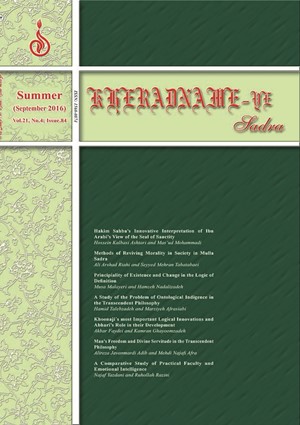Man’s Freedom and Divine Servitude in the Transcendent Philosophy
Subject Areas :
1 -
Keywords: Soul Freedom Servitude Wisdom theoretical intellect practical intellect,
Abstract :
Similar to other Islamic philosophers, Mulla Sadra views Man in the middle of the origin and the return. Accordingly, he speaks about the quality of their origination and return towards the Origin of all origins. Given his own particular philosophical principles, such as the principiality, gradation, simplicity, and the trans-substantial motion of existence, he studies Man on the path of being and maintains that, as wayfarers of the path of existence, they travel from existence in existence, with existence, and towards existence. In this approach, human freedom, as a soulis habitus and moral virtue, has an ontological meaning that can be perceived in the light of theoretical and practical types of wisdom. According to Mulla Sadra, this level of existence can be attained by those human beings who, firstly, manage to develop a correct knowledge of existence and their own ontological truth from the viewpoint of theoretical wisdom and prepare their souls for receiving and observing true teachings from the supreme origins. Secondly, from the view point of practical wisdom, through having their rational faculty dominate their faculties of appetite and anger, they need to establish a balance in satisfying the demands of these faculties. A divine philosopher is the same true believer who has succeeded in attaining the end of theoretical wisdom, that is, the light and end of practical wisdom or the same open-mindedness. Freedom, which means liberation from all limitations, becomes manifest in its supreme meaning, that is, the same divine servitude that equals desiring and paying attention to the Absolute in a way that the wayfarer is freed from the ties of what is other than the Truth and is mortalized in the Truth.
شرح المصطلحات الفلسفية، انتشارات مجمع البحوث الاسلامية، چاپ اول، مشهد، 1414 ق.#
بغدادي، ابو البركات، المعتبر في الحكمة، ج2، انتشارات دانشگاه اصفهان، چاپ دوم، اصفهان، 1387.#
تهانوي، محمد علي، كشاف اصطلاحات الفنون و العلوم، ج1، چاپ اول، انتشارات مكتبة لبنان ناشرون، بيروت، 1996م.#
جرجاني، السيد الشريف علي بن محمد، التعريفات، چاپ چهارم، انتشارات ناصر خسرو، تهران، 1370.#
رازي، فخر الدين، المباحث المشرقية في علم الالهيات و الطبيعيات، ج2، انتشارات بيدار، چاپ دوم، قم، 1411 ق.#
شهرزوري، شمس الدين، رسائل الشجرة الالهية في علوم الحقائق الربانية، تصحيح نجفقلي حبيبي، انتشارات مؤسسة حكمت و فلسفه ايران، چاپ اول، تهران، 1383.#
صليبا، جميل، المعجم الفلسفي، ج1، انتشارات الشركة العالمية للكتاب، بيروت، 1414 ق.#
ملاصدرا، الحكمة المتعالية في الاسفار العقلية الاربعة، ج3، تصحيح مقصود محمدي، چاپ اول، تهران، انتشارات بنياد حكمت اسلامي صدرا، بهار 1383.#
ملاصدرا، الحكمة المتعالية في الاسفار العقلية الاربعة، ج8، تصحيح علي اكبر رشاد، چاپ اول، تهران، انتشارات بنياد حكمت اسلامي صدرا، بهار 1383.#
ملاصدرا، الحكمة المتعالية في الاسفار العقلية الاربعة، ج9، تصحيح رضا اكبريان، چاپ اول، تهران، انتشارات بنياد حكمت اسلامي صدرا، بهار 1382.#
ملاصدرا، الشواهد الربوبيه في المناهج السلوكيه، تصحيح سيد مصطفي محقق داماد، چاپ اول، تهران، انتشارات بنياد حكمت اسلامي صدرا، 1382.#
ملاصدرا، المبدا و المعاد، ج2، تصحيح محمد ذبيحي و جعفر شاه نظري، چاپ اول، تهران، انتشارات بنياد حكمت اسلامي صدرا، زمستان1381.#
ملاصدرا، رساله سه اصل، تصحيح سيد حسين نصر، چاپ دوم، تهران، انتشارات بنياد حكمت اسلامي صدرا، 1390.#
ملاصدرا، مفاتيح الغيب، ج1، تصحيح نجفقلي حبيبي، چاپ اول، تهران، انتشارات بنياد حكمت اسلامي صدرا، 1386.#
ملاصدرا، مفاتيح الغيب، ج2، تصحيح نجفقلي حبيبي، چاپ اول، تهران، انتشارات بنياد حكمت اسلامي صدرا، 1386.#
مجلسي، محمد تقي، بحار الانوار، ج2، انتشارات موسسه الوفاء، بيروت، لبنان، بيتا.#
نجفي افرا، مهدي، معاد در فلسفة صدرايي، چاپ اول، انتشارات دانشگاه آزاد اسلامي واحد تهران مركزي، تهران،1392.#


